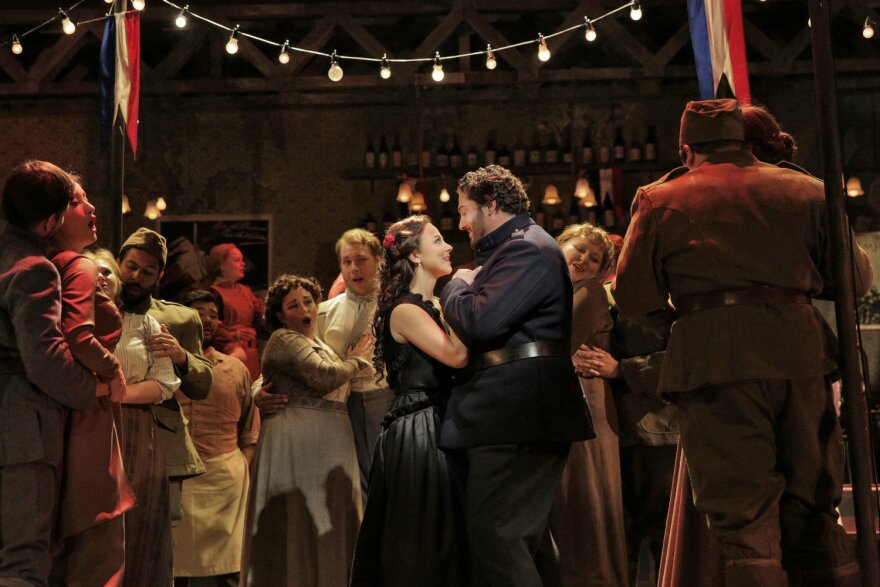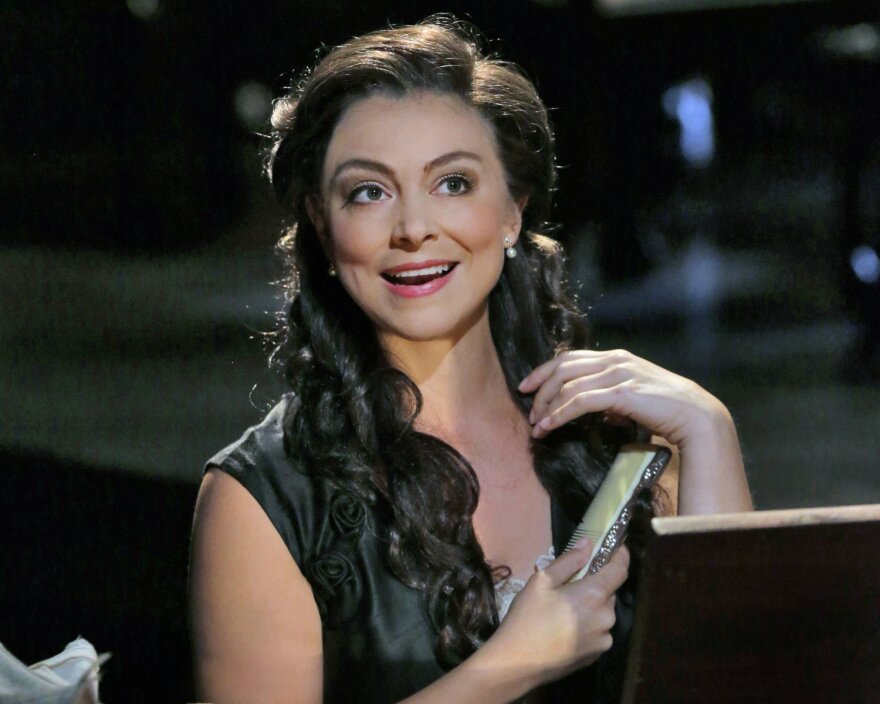By the time the opera “La rondine” finally was given its première in Monte Carlo in 1917, the world as the West had known it for centuries had begun to fall to pieces inexorably. By 1918 those pieces were on scattered on the bloody battlefields of the War to End All Wars in Europe. And in the Treaty of Trianon of 1920, the Austria-Hungarian Empire — the hyperpolyglotical, politically impossible puzzle, the glittering, romantic, artistically revolutionary, Freudian and volcanic Danubian monarchy — was gone. Out of this ghastly and tragic mess evolved World War II and more tragedy, bloodshed and horrors, the financial and human costs of which we continue to pay.
Just before the beginning of the war, the late 19th-early 20th century Italian opera sovereign Giacomo Puccini was commissioned by the Carltheater in the municipal district of Leopoldstadt in Vienna to produce an opera rather like “Der Rosenkavalier” of Richard Strauss. This was 1913, a year before Archduke Ferdinand, heir presumptive to the Austria-Hungary throne, was assassinated at Sarajevo. From that murder exploded the commencement of a string of cataclysms that may have changed in their forms and natures but have never ceased.
Nevertheless, the show went on, although not in Leopoldstadt. Initially, however, because of the war in which Italy and Austria-Hungary were contestants, its first performance was moved of necessity to neutral Monaco, where it was well received at the sumptuous Opéra de Monte-Carlo.
This opera, given a musically alluring but rather emotionally pinched opening night performance Saturday by Opera Theatre of St. Louis, walked upon shaky pins from its genesis. Its reputation was ever diminished by the judgment of Tito Ricordi, scion of the mightily influential Milanese music-publishing house, Casa Ricordi. Ricordi refused to publish it, Puccini or no Puccini, and professional and familial loyalties be damned. He dismissed “La rondine” mercilessly as “bad Lehár,” effectively sending it to the junior varsity music bench or worse, and disdaining it as an imitation of the style of work of Merry-Widow operetta meister, Franz Lehár.
Three versions of the three-act piece, “La rondine,” exist, and Puccini never actually finished fiddling with it. And to tell the truth, “La rondine” seems indecisive, and certainly is not Puccini at his most artistically magnificent and original.
Regular, and perhaps even occasional, visitors to the opera house cannot miss the fact that it resembles in its narrative the “La traviata” of Giuseppe Verdi and, in a slightly skewed fashion, Puccini’s own “La bohème.” However, its being dispatched to the second or even the third ranks is not exactly faint praise when you consider its internal competition – those aforementioned triumphant Puccini masterpieces, “Madama Butterfly” and “La bohème,” and even the delicious, hilarious and subversive one-acter, “Gianni Schicchi.”
The Italian word rondine is translated “swallow,” a passerine or perching bird that flits around rather merrily and erratically. And indeed the heroine of the piece, Magda de Civry (Corinne Winters), flits from her Paris salon and from her lover/sugar daddy, Rambaldo Fernandez (Matthew Burns), to the Bal Bullier in Montparnasse, where Ruggero Lasgouc (Anthony Kalil) saves her from assault by a belligerently randy group of students. Then, in a twinkling she falls in love with Lasgouc, and they — Magda and Ruggero — repair south to Nice, and in Nice things also go south for the couple: huge bills, no money, ambivalence about their apparently antiseptic affair, insecurity, moral turpitude and serious class differences.
The latter — the ancient irrational and almost random tribal separations of the “Thems” from the “Us-es” — ratchets up this opera a few notches from an account of garden-variety personal recklessness, sloth and concupiscence to a more universal consideration that continues to mock and to separate the human community. But in no wise, because of the moral flaccidness and uniform dreariness of most of the principal characters and minor ones as well, does our swallow-opera ascend to the tragic plane of “Madama Butterfly” or swoop down into the profound sadnesses of “La bohème. Rather than gasping “Oh no!” one is rather inclined to mutter, “So what.”

Nevertheless, this “La rondine” was presented competently at least and quite well at its best, in an adaptable and thrifty setting of spare refinement. Thanks are presented abundantly to stage director Michael Gialeta for a performance that is decorous and respectful of the work of the composer, librettist, cast and chorus.
The “La rondine” principals sang their parts satisfactorily, and the celestial Corinne Winters’ exulting performance is worth the price of the ticket. She is a genuine, solid gold-star artiste, and her career is one more chapter in Opera Theatre’s inestimable book of legend. The St. Louis Symphony Orchestra was in the pit, continuing its ascendency, and for this show was conducted by the redoubtable Stephen Lord.
The choristers, prepared by chorus master Robert Ainsley, deserve multiple pats on the back, standing ovations and bravos not only for their singing but for their graceful passages through the show and for their participation in an exquisite tableau of this Rondine’s act two, the gloriousness of which I’ve not seen since the “Falstaff” directed by Jonathan Miller in Santa Fe in 2001. Hearty appreciative applause goes to the exuberant audience as well. For 39 years and 40 seasons, it has maintained a thoughtful and ever-generous presence in the playhouse in Webster Groves, making certain by its patronage, its standing ovations and its pluck that St. Louis has opera, and a glorious, well-managed opera at that.
Opera Theatre of St. Louis
Where: Loretto-Hilton Center, 130 Edgar Rd. on the campus of Webster University
Cost: tickets start at $50
Information: www.opera-stl.org
- THE BARBER OF SEVILLLE (Rossini) 8 p.m. June 4, 10 & 27; 7 p.m. June 6 & 14; 1 p.m. June 17
- LA RONDINE (Puccini ) 8 p.m. June 3, 12 & 18; 7 p.m. June 28; 1 p.m. June 20 & 24
- RICHARD THE LIONHEART (Handel) 8 p.m. June 11, 20, 24 & 26; 7 p.m. June 7, 1 p.m. June 13
- EMMELINE (Picker) 8 p.m. June 13, 17, 19 & 25, 7 p.m. June 21; 1 p.m. June 27




